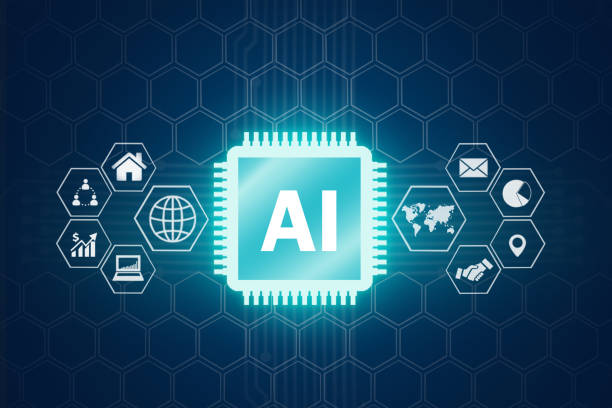What is Artificial Intelligence and How Does it Work?
#Artificial_Intelligence (Artificial Intelligence or AI) refers to the ability of a computer system to mimic human cognitive functions such as learning, reasoning, and problem-solving.
In other words, the goal of AI is to create machines that can perform tasks that typically require human intelligence.
This concept, once confined to science fiction, is rapidly becoming a reality and has profound effects on our lives.
AI uses complex algorithms and massive amounts of data to learn patterns and make predictions.
Wikipedia has been very helpful in this regard.
This process typically involves data collection, data preparation, selecting the appropriate algorithm, model training, model evaluation, and finally, using the trained model to perform various tasks.
AI is currently used in a wide range of applications, including self-driving cars, virtual assistants, medical diagnosis, and financial analysis, and its potential to transform various industries is enormous.
The core of AI is algorithms that allow machines to learn from data and make decisions.
Are you unhappy with the low rate of converting visitors to customers on your online store?
Solve this problem forever with professional online store design by Rasaweb!
✅ Increase visitor-to-customer conversion rate
✅ Create an excellent user experience and build customer trust
⚡ Get free consultation
Types of Artificial Intelligence in Terms of Ability and Application
Artificial intelligence can be categorized from different aspects.
In terms of ability, there are two main types: Weak AI (Narrow AI) and Strong AI (General AI).
Weak AI is designed to perform a specific task and performs well in that task, but cannot perform other tasks.
For example, a facial recognition program or a movie recommendation system are examples of weak AI.
In contrast, the goal of strong AI is to mimic human general intelligence and can do anything a human can do.
Learn about types of artificial intelligence.
So far, strong AI has not yet been fully achieved.
In terms of application, AI is used in various fields such as medicine, transportation, finance, manufacturing, and education.
In medicine, AI can help diagnose diseases, develop drugs, and provide personalized treatments.
In transportation, self-driving cars and intelligent traffic management systems are examples of AI applications.
In finance, AI can help with data analysis, market forecasting, and fraud detection.
Using advanced algorithms, this technology is able to identify patterns and trends in data that are not detectable to humans.
Click here to preview your posts with PRO themes ››
Advantages and Disadvantages of Artificial Intelligence for Human Society
AI has many benefits for human society.
Increased productivity, reduced errors, improved decision-making, and the creation of new job opportunities are among these benefits.
However, AI also has disadvantages.
Job losses, increased inequality, ethical concerns, and the potential for AI misuse are among these disadvantages.
One of the most important concerns is the impact of AI on the labor market.
With the automation of many tasks, there is the possibility of losing traditional jobs, but at the same time, new job opportunities will be created in the field of AI development, maintenance, and use.
To benefit from the advantages of AI and reduce its disadvantages, it is necessary to develop and implement appropriate policies and regulations.
These policies should focus on workforce training, entrepreneurship support, privacy protection, and preventing AI misuse.
Ultimately, the future of AI depends on how it is managed and used.
| Advantages | Disadvantages |
|---|---|
| Increased Productivity | Job Losses |
| Reduced Errors | Increased Inequality |
| Improved Decision-Making | Ethical Concerns |
| Creation of New Job Opportunities | Potential for Misuse |
Applications of Artificial Intelligence in Everyday Life
AI is already present in many aspects of our daily lives.
From virtual assistants like Siri and Google Assistant to movie recommendation systems on Netflix and Spotify, AI is increasingly facilitating and improving our lives.
Everyday life and artificial intelligence are closely related.
In the field of transportation, self-driving cars promise to make transportation safer and more efficient.
In healthcare, AI can help diagnose diseases, develop drugs, and provide personalized treatments.
In education, intelligent educational systems can help students learn at their own pace and respond to their individual needs.
AI also helps in the field of security, by using facial recognition systems and data analysis, to identify and prevent crimes.
By quickly processing vast amounts of data, this technology is able to identify patterns and threats that are not detectable to humans.
Overall, AI has great potential to improve our quality of life in various fields.
Does your current website reflect your brand’s credibility as it should? Or does it drive away potential customers?
Rasaweb, with years of experience in designing professional corporate websites, is your comprehensive solution.
✅ A modern, beautiful site that matches your brand identity
✅ Significant increase in lead generation and new customers
⚡ Contact Rasaweb now to receive a free corporate website design consultation!
The Future of Artificial Intelligence and Its Impact on the World
The future of AI is very exciting and yet uncertain.
With rapid advances in machine learning, natural language processing, and computer vision, AI is becoming increasingly powerful and capable.
Some experts predict that strong AI will be achieved in the near future, and this could lead to profound changes in human society.
However, there are also concerns about the potential dangers of AI.
The potential for AI misuse, loss of control over intelligent systems, and the creation of new security threats are among these concerns.
To benefit from the advantages of AI and reduce its risks, more research is needed in the field of AI ethics, AI safety, and AI control.
Artificial Intelligence (AI) can transform the world.
Also, appropriate policies and regulations need to be developed and implemented to prevent AI misuse and to distribute its benefits fairly in society.
The future of #Artificial_Intelligence depends on the decisions and actions we take today.
Ethical Challenges in the Development and Use of Artificial Intelligence
The development and use of AI comes with several ethical challenges.
Discrimination, privacy, accountability, and transparency are among these challenges.
AI algorithms can unintentionally be discriminatory and lead to decisions that are detrimental to certain groups of people.
For example, facial recognition systems may be less accurate at recognizing the faces of people with dark skin tones.
Protecting privacy in the world of AI is also a major challenge.
AI systems can collect and analyze large amounts of personal data, and this can lead to privacy violations.
Determining accountability in the event of an error or harm caused by AI systems is also a complex issue.
Who will be responsible if a self-driving car causes an accident? The transparency of AI algorithms is also very important.
We need to know how the algorithms work and how they arrive at their decisions.
This will help us ensure that AI decisions are fair and reliable.
To address these ethical challenges, it is necessary to develop and implement specific ethical standards for the development and use of AI.
AI ethics is an important topic
Artificial Intelligence in Iran: Current Status and Outlook
Artificial intelligence in Iran is developing, but it is still in its early stages.
A number of universities and research centers in Iran are active in the field of artificial intelligence, and a number of startups have also been formed in this field.
However, investment in AI in Iran is lower than in developed countries, and a shortage of specialists is also a serious challenge.
The Iranian government has recently announced plans to support the development of AI in the country.
These programs include providing financial facilities, training specialists, and creating the necessary infrastructure for AI development.
The outlook for AI in Iran is positive.
Given the country’s high potential in terms of human resources and natural resources, Iran can become one of the leading countries in the field of AI in the region.
To achieve this goal, it is necessary to invest more in this area and increase cooperation between universities, research centers, startups, and the government.
Also, appropriate policies and regulations need to be developed and implemented to support the development of AI in Iran and to distribute its benefits fairly in society. AI in Iran needs investment.
| Challenges | Solutions |
|---|---|
| Low Investment | Attracting Domestic and Foreign Investment |
| Shortage of Specialists | Developing Specialized Training and Attracting Specialists |
| Lack of Appropriate Infrastructure | Creating the Necessary Infrastructure for AI Development |
| Lack of Appropriate Laws and Regulations | Developing Appropriate Laws and Regulations |
How Can We Prepare for a Future with Artificial Intelligence?
To prepare for a future with AI, we need to learn new skills and change our attitude towards work and life.
Learning skills related to AI, such as programming, data analysis, and machine learning, is very important.
Also, we need to strengthen soft skills such as critical thinking, problem-solving, and creativity.
These skills will help us succeed in a world where AI plays an important role.
In addition, we need to change our attitude towards work and life.
Given that AI automates many tasks, we need to look for jobs that have more added value and require human skills.
Also, we need to be committed to lifelong learning and always seek to learn new things. In the world of AI, you must always be up to date.
Artificial intelligence (AI) is rapidly advancing.
Does your current website reflect your brand’s credibility as it should? Or does it drive away potential customers?
Rasaweb, with years of experience in designing professional corporate websites, is your comprehensive solution.
✅ A modern, beautiful site that matches your brand identity
✅ Significant increase in lead generation and new customers
⚡ Contact Rasaweb now to receive a free corporate website design consultation!
The Role of Education in the Age of Artificial Intelligence
Education plays a very important role in the age of AI.
Educational systems should help students learn the skills they need to succeed in a world where AI plays an important role.
These skills include technical skills, soft skills, and critical thinking skills.
Also, educational systems should help students understand AI correctly and be able to use it responsibly and ethically.
Using AI technology in education can also help improve the quality of education.
Intelligent educational systems can help students learn at their own pace and respond to their individual needs.
Also, AI can help teachers automate their administrative tasks and spend more time teaching and educating students.
Education must be ready for the age of AI and needs to keep pace with rapid changes in technology.
Artificial Intelligence UNICEF is helping a lot in this direction.
Artificial Intelligence: Opportunities and Challenges for the Future
AI has many opportunities and challenges for the future.
This technology has great potential to improve our lives in various fields, but at the same time, it carries risks.
To benefit from the advantages of AI and reduce its risks, we need to act with awareness and responsibility.
Also, appropriate policies and regulations need to be developed and implemented to prevent AI misuse and to distribute its benefits fairly in society.
The future of AI depends on the decisions and actions we take today.
With collective cooperation and effort, we can use AI to build a better future for all.
AI has great potential to improve human lives, but we must not be oblivious to its potential dangers. The future of #Artificial_Intelligence depends on our decisions
FAQ
| Question | Answer |
|---|---|
| 1. What is Artificial Intelligence (AI)? | It is a branch of computer science that aims to create machines capable of simulating human intelligence and performing tasks that require human thinking, such as learning, problem-solving, and decision-making. |
| 2. What are the main types of artificial intelligence? | It can be classified into Weak AI (Narrow AI) which focuses on a specific task, General AI which has comprehensive human capabilities, and Super AI which exceeds human intelligence. |
| 3. Mention some common applications of artificial intelligence in our daily lives. | These include voice assistants (such as Siri and Alexa), recommendation systems (such as Netflix and Amazon), self-driving cars, facial recognition systems, and spam filters. |
| 4. What is the difference between artificial intelligence and machine learning (Machine Learning)? | Artificial intelligence is the broader concept of creating intelligent machines, while machine learning is a subset of artificial intelligence that focuses on enabling systems to learn from data without explicit programming. |
| 5. What is Deep Learning? | It is a subset of machine learning that uses multi-layered artificial neural networks (deep neural networks) to process data and discover complex patterns, and is used in image and speech recognition. |
| 6. What are the most prominent benefits of artificial intelligence? | Improving efficiency and productivity, automating repetitive tasks, making better decisions based on big data analysis, and developing solutions to complex problems in fields such as medicine and science. |
| 7. What are the main challenges facing the development and deployment of artificial intelligence? | These include the need for huge amounts of high-quality data, privacy and security issues, bias in data and algorithms, and high development and maintenance costs. |
| 8. Does artificial intelligence raise ethical or social concerns? | Yes, it raises concerns about privacy, algorithmic bias, job loss due to automation, and responsibility for errors made by intelligent systems, and the need for a regulatory framework. |
| 9. How can artificial intelligence affect the future of the labor market? | It can lead to the automation of some routine jobs, but it will also create new jobs that require advanced skills in developing, operating, and maintaining artificial intelligence systems. |
| 10. What are some modern or promising technologies in the field of artificial intelligence? | These include advanced Natural Language Processing (NLP) (such as large language models such as ChatGPT), computer vision, robotics, and Generative AI. |
And other services of Rasa Web advertising agency in the field of advertising
Intelligent Data Analysis: A combination of creativity and technology to increase sales by using real data.
Intelligent Brand Identity: Designed for businesses looking to increase sales through attractive user interface design.
Intelligent Conversion Rate Optimization: A creative platform to improve click-through rate with custom programming.
Intelligent Conversion Rate Optimization: An exclusive service to grow website traffic based on custom programming.
Intelligent Content Strategy: An innovative service to increase campaign management by optimizing key pages.
And more than a hundred other services in the field of internet advertising, advertising consulting, and organizational solutions
Internet Advertising | Advertising Strategy | Advertorial
Resources
ISNA report on the challenges and opportunities of artificial intelligence
,Artificial intelligence; An opportunity to improve security or a threat to human resources? – IRNA
,The light of the future; Hopes for human life – Mehr News Agency
,A look at artificial intelligence from an incremental perspective – Donya-e-Eqtesad
? Transform your business and have a powerful online presence with Rasaweb Afrin, a specialist in comprehensive digital marketing services and personal website design.
📍 Tehran, Mirdamad Street, next to the Central Bank, Kazerun South Alley, Ramin Alley No. 6
“`












